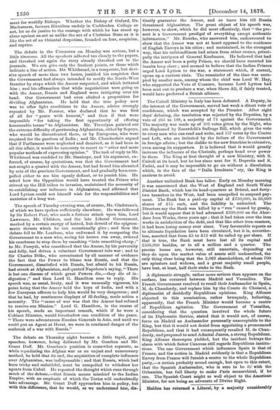The debate on Thursday night became a little tepid, good
speeches, however, being delivered by Mr. Goschen and Mr. Grant Duff. Mr. Goschen's position is somewhat separate, as while repudiating the Afghan war as an unjust and unnecessary method, he held that its end, the acquisition of complete influence over Afghanistan, was indispensable ; and that Russia, which had been tricky and unfaithful, must be compelled to withdraw her agents from Cabal. He repeated the thought which runs through much of the debate,—that Russia means mischief to the Indian Empire, with an emphasis of which the Tories will undoubtedly take advantage. Mr. Grant Duff approaches him in policy, but with this difference, that he would, as we understand him, dis-
tinctly guarantee the Ameer, and so leave him till Russia threatened Afghanistan. The great object of his speech was, however, to show, which he did most effectively, that "the pre- sent is a Government prodigal of everything except authentic information." Mr. Bourke, who answered him, endeavoured to ' show that the Ameer was not at heart opposed to the residence of English Envoys in his cities ; and maintained, in the strongest way, that his unfriendliness had arisen from other causes, princi- pally the intrigues of General Kaufmann. He believed that had the Ameer not been a petty Prince, we should have resented his insults long since ; and seemed to believe that the Indian Princes urged Lord Lytton to the war, a statement which, if correct, opens up a curious vista. The remainder of the time was occu- pied by smaller men, among whom the chief was Lord W. Hay, who supported the Vote of Censure, because Lord Lytton had been sent out to produce a war, when Shere Ali, if fairly treated, would have preferred a British alliance.






































 Previous page
Previous page